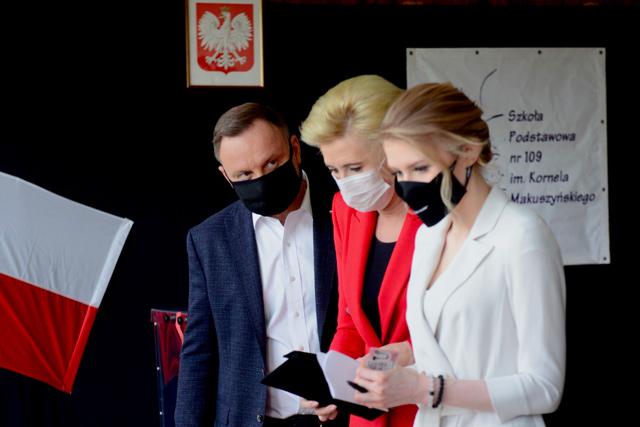- International News
- Mon-2020-07-13 | 03:43 pm

The stakes are high for Poland's right-wing Law and Justice (PiS) Party government, which has relied on incumbent President Andrzej Duda to push through judicial reforms that have set Warsaw on a collision course with the EU over democratic standards just three decades after communism's demise.
Duda is locked in a tight race with Warsaw mayor Rafal Trzaskowski of the opposition Civic Platform (PO) and final opinion polls showed an almost even split between the two.
Wojciech, a 59-year-old builder, said he chose Duda for his close ties to Trump and because he "agrees completely" with the incumbent's vow to ban adoption for same-sex couples.
"Duda's cooperation with Trump means we can count on the US for defence," he told AFP after voting in Warsaw, declining to give his surname.
But Warsaw pensioners who identified themselves only as Helena and Maria, both in their eighties, said they chose the pro-European Trzaskowski in the hope he could "get things back on the right track with the EU".
"We remember too well how it was before [under communism], so for our grandchildren we want Poland to be stable in Europe," Helena told AFP.
Long queues formed at polling stations as social distancing measures were in effect to stem coronavirus infections.
Voters were also required to wear masks, use hand sanitiser and their own pens, plus to give priority to pensioners, pregnant women and voters with children.
The election had been due in May — at a time when Duda was riding high in opinion polls — but was delayed because of the pandemic.
Duda's support has slipped considerably since then, partly because of the virus fallout, which is pushing Poland into its first recession since communism fell.
Too close to call?
Polls opened at 05:00 GMT and will close at 19:00 GMT, with an exit poll scheduled shortly after that and the first official results only expected Monday morning.
Experts are warning that Sunday's result could be so close that legal challenges and protests may ensue.
In the first round on June 28, Duda came first with 43.5 per cent and Trzaskowski second with 30.4 per cent.
But Trzaskowski will be hoping to sweep up votes from Poles who supported other opposition candidates.
Eurasia Group, a political risk consultancy, said he has had to mobilise very disparate parts of the electorate against Duda and the incumbent would therefore likely win, though by a narrow margin.
"This election will determine Poland's fate for the foreseeable future," said Adam Strzembosz, a former supreme court chief justice and highly respected professor of law.
"Will it be dominated and completely subservient to a certain political party, with all the consequences of power that is dictatorial in nature? Or will we manage to stop this?"













